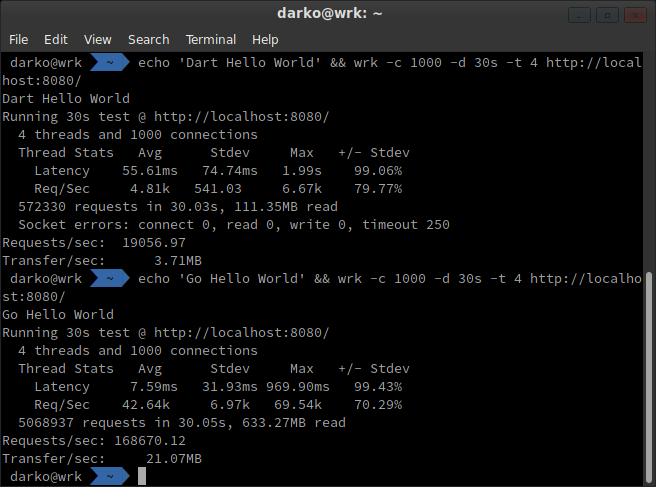Dart vs Go
Dartlang vs Golang
HTTP performance
A simple test
server.dart
|
1 2 3 4 5 6 7 8 9 10 |
import 'dart:io'; void main() { HttpServer.bind('localhost', 8080).then((server) { server.listen((request) { request.response.write('Hello World'); request.response.close(); }); }); } |
main.go
|
1 2 3 4 5 6 7 8 9 10 11 12 13 |
package main import ( "fmt" "net/http" ) func main() { http.HandleFunc("/", func(w http.ResponseWriter, r *http.Request) { fmt.Fprintln(w, "Hello World") }) http.ListenAndServe(":8080", nil) } |
Dart v2.5.2
Go v1.13.1
OS: Linux
Test runner: wrk
Threads: 4
Duration: 30 seconds
Concurrency: 1000
Results:
I wrote this blog post because I could not find a proper result for “Dart vs Go performance”.
So there you have it
|
1 2 3 4 5 6 7 8 9 10 11 12 13 14 15 16 17 18 19 20 |
Dart Hello World Running 30s test @ http://localhost:8080/ 4 threads and 1000 connections Thread Stats Avg Stdev Max +/- Stdev Latency 55.61ms 74.74ms 1.99s 99.06% Req/Sec 4.81k 541.03 6.67k 79.77% 572330 requests in 30.03s, 111.35MB read Socket errors: connect 0, read 0, write 0, timeout 250 Requests/sec: 19056.97 Transfer/sec: 3.71MB Go Hello World Running 30s test @ http://localhost:8080/ 4 threads and 1000 connections Thread Stats Avg Stdev Max +/- Stdev Latency 7.59ms 31.93ms 969.90ms 99.43% Req/Sec 42.64k 6.97k 69.54k 70.29% 5068937 requests in 30.05s, 633.27MB read Requests/sec: 168670.12 Transfer/sec: 21.07MB |
I believe it’s a pretty large score 1:0 for Go on the server side in terms of performance.
Updated on 26 July 2020:
Dart VM version: 2.8.4 (stable) (Wed Jun 3 12:26:04 2020 +0200) on “linux_x64”
go version go1.14.5 linux/amd64
changed Go code to utilize only 1 cpu
|
1 2 3 4 5 6 7 8 9 10 11 12 13 14 15 |
package main import ( "fmt" "net/http" "runtime" ) func main() { runtime.GOMAXPROCS(1) http.HandleFunc("/", func(w http.ResponseWriter, r *http.Request) { fmt.Fprintln(w, "Hello World") }) http.ListenAndServe(":8080", nil) } |
|
1 2 3 4 5 6 7 8 9 10 11 12 13 14 15 16 17 18 19 20 |
Go 1 Thread Performance Running 30s test @ http://localhost:8080/ 4 threads and 1000 connections Thread Stats Avg Stdev Max +/- Stdev Latency 20.09ms 6.81ms 227.71ms 94.22% Req/Sec 12.62k 1.01k 15.67k 68.65% 1501337 requests in 30.06s, 184.70MB read Requests/sec: 49949.34 Transfer/sec: 6.14MB Dart Performance Running 30s test @ http://localhost:8080/ 4 threads and 1000 connections Thread Stats Avg Stdev Max +/- Stdev Latency 49.51ms 83.87ms 2.00s 98.76% Req/Sec 5.51k 0.86k 7.99k 88.13% 656185 requests in 30.03s, 127.66MB read Socket errors: connect 0, read 0, write 0, timeout 317 Requests/sec: 21854.54 Transfer/sec: 4.25MB |
Still a pretty big 1:0 for Go
Note: The 2 tests were done one 2 different machines.


Great, thanks for this little comparison 😉
This was the best Go vs Dart comparison. Good job mate!
I think this is an unfair comparison because the go code is multi-threaded but the dart code isn’t, as the HTTP server is a very basic implementation.
I found a framework that is supposed to be multi-threaded (https://aqueduct.io/) and did a simple test with it and it is a bit better (my results with the same test as in here were ~200k req/s for go and ~10k req/s for the implementation here, and ~35k req/s for aqueduct with 4 threads too). Another catch is dart can be compiled to native code or run a VM, but not all packages work compiled as native code, and this aqueduct framework uses one of them so I had to do the test in the VM.
Because of this I tried (very hard) to do a simple implementation using a pool of Isolates (threads) with plain dart but failed, mainly because isolate can only communicate via messages that can only be of primitive types (int, String, etc.), so I can’t really reply to requests in other threads.
I was really interested in knowing how dart performance compares to go, and this was an interesting example. It’s a bit sad to realize that dart isn’t even capable to offer a multi-threading flexible enough to implement a decent web server…
Thank you for your insights, Luca. I have added new results with a GOMAXPROCS=1 in Go’s case.